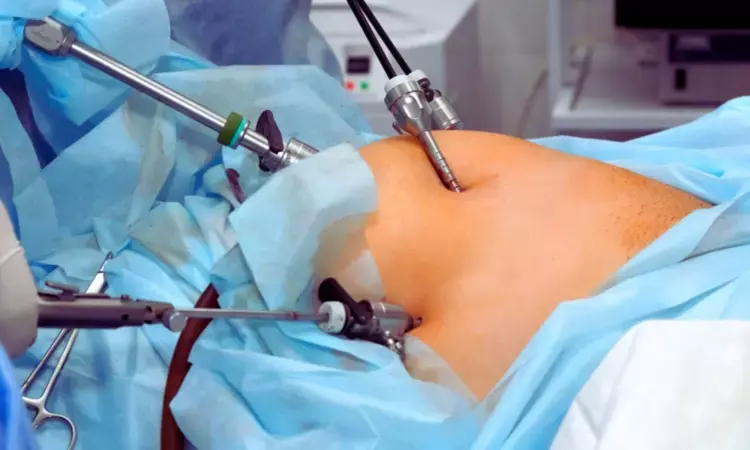- Home
- Medical news & Guidelines
- Anesthesiology
- Cardiology and CTVS
- Critical Care
- Dentistry
- Dermatology
- Diabetes and Endocrinology
- ENT
- Gastroenterology
- Medicine
- Nephrology
- Neurology
- Obstretics-Gynaecology
- Oncology
- Ophthalmology
- Orthopaedics
- Pediatrics-Neonatology
- Psychiatry
- Pulmonology
- Radiology
- Surgery
- Urology
- Laboratory Medicine
- Diet
- Nursing
- Paramedical
- Physiotherapy
- Health news
- Fact Check
- Bone Health Fact Check
- Brain Health Fact Check
- Cancer Related Fact Check
- Child Care Fact Check
- Dental and oral health fact check
- Diabetes and metabolic health fact check
- Diet and Nutrition Fact Check
- Eye and ENT Care Fact Check
- Fitness fact check
- Gut health fact check
- Heart health fact check
- Kidney health fact check
- Medical education fact check
- Men's health fact check
- Respiratory fact check
- Skin and hair care fact check
- Vaccine and Immunization fact check
- Women's health fact check
- AYUSH
- State News
- Andaman and Nicobar Islands
- Andhra Pradesh
- Arunachal Pradesh
- Assam
- Bihar
- Chandigarh
- Chattisgarh
- Dadra and Nagar Haveli
- Daman and Diu
- Delhi
- Goa
- Gujarat
- Haryana
- Himachal Pradesh
- Jammu & Kashmir
- Jharkhand
- Karnataka
- Kerala
- Ladakh
- Lakshadweep
- Madhya Pradesh
- Maharashtra
- Manipur
- Meghalaya
- Mizoram
- Nagaland
- Odisha
- Puducherry
- Punjab
- Rajasthan
- Sikkim
- Tamil Nadu
- Telangana
- Tripura
- Uttar Pradesh
- Uttrakhand
- West Bengal
- Medical Education
- Industry
Laparoscopic Groin Hernia Repair Tied to Lower Reoperation Risk in Women: Danish Study

Denmark: A nationwide Danish study published in the Annals of Surgery reveals that women who undergo laparoscopic groin hernia repair are significantly less likely to require repeat surgery for recurrence compared to men. According to the findings, women had a 41% lower risk of reoperation for recurrent hernia following this procedure.
The research, led by Jacob Rosenberg and Jason Joe Baker from the Center for Perioperative Optimization, Copenhagen University Hospital - Herlev and Gentofte, analyzed outcomes using Denmark’s comprehensive health databases. It specifically addressed whether laparoscopic hernia repair—an increasingly common surgical approach—affects long-term recurrence risk differently in men and women.
Historically, female patients were thought to face higher recurrence rates after open hernia repair, possibly due to missed femoral hernias. Laparoscopic techniques, which provide a clear view of all potential hernia sites, may help overcome this limitation. The study sought to test this assumption in a large real-world population.
The team conducted a register-based cohort analysis using data from the Danish Inguinal Hernia Database and national health records. They identified 6,275 female patients who underwent elective primary laparoscopic groin hernia repair and matched them in a 1:3 ratio with 18,825 male patients based on hernia type, size of the defect, age, and duration of follow-up.
The following findings were reported:
- 2.2% of female patients required reoperation for recurrent hernia during the study period.
- 3.6% of male patients required reoperation for recurrent hernia.
- After adjusting for confounding factors, women had a 41% lower risk of needing repeat surgery (hazard ratio 0.59).
- Sensitivity analyses that accounted for comorbidities confirmed these findings.
- Older age was independently associated with an increased risk of hernia recurrence and reoperation.
- The size of the hernia defect (EHS grade 3) did not have a significant impact on the risk of recurrence.
“These findings suggest that laparoscopic repair offers an especially effective option for women with groin hernias,” the authors concluded. In contrast to older data on open surgery, laparoscopic repair appears to mitigate the historically higher recurrence rates observed in female patients.
The researchers emphasized that their findings support current guidelines recommending laparoscopy for female groin hernia repair. They also noted that these results are likely applicable in countries with universal healthcare systems similar to Denmark’s, though variations in surgical access elsewhere may influence outcomes.
As minimally invasive surgery continues to evolve, this large-scale study provides important real-world evidence favoring laparoscopic repair for women and adds to the growing body of literature guiding individualized surgical care.
Reference:
Rosenberg, Jacob MD, DSc, FACS; Baker, Jason Joe MD, PhD. Female Patients Have a Reduced Risk of Reoperation for Recurrence After Laparoscopic Groin Hernia Repair: A Case-control Matched Nationwide Register-based Study. Annals of Surgery ():10.1097/SLA.0000000000006786, June 16, 2025. | DOI: 10.1097/SLA.0000000000006786
Dr Kamal Kant Kohli-MBBS, DTCD- a chest specialist with more than 30 years of practice and a flair for writing clinical articles, Dr Kamal Kant Kohli joined Medical Dialogues as a Chief Editor of Medical News. Besides writing articles, as an editor, he proofreads and verifies all the medical content published on Medical Dialogues including those coming from journals, studies,medical conferences,guidelines etc. Email: drkohli@medicaldialogues.in. Contact no. 011-43720751


